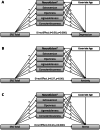Personality as a mediator of autistic traits and internalizing symptoms in two community samples
- PMID: 35346350
- PMCID: PMC8962582
- DOI: 10.1186/s40359-022-00774-z
Personality as a mediator of autistic traits and internalizing symptoms in two community samples
Abstract
Background: Autism spectrum disorder (ASD) is characterized by deficits in social functioning and is comorbid with internalizing disorders and symptoms. While personality is associated with these symptoms and social functioning in non-ASD samples, its role mediating the relationship between ASD traits and internalizing symptoms is not clear.
Methods: We studied the mediating effect of personality on the correlations between ASD traits and internalizing symptoms (i.e., depression, anxiety, stress) in two samples. Additionally, we explored the moderating effect of gender. Analyses were applied to a small (Study 1; N = 101) undergraduate sample. A broader sample recruited via an online crowdsourcing platform (Study 2; N = 371) was used to validate the results.
Results: Study 1's mediation analyses revealed that neuroticism was the only significant mediator. Study 2 replicated these results by finding extraversion to be an additional mediator for anxiety and extraversion, openness, and agreeableness as additional mediators for stress. Moderation analyses revealed that gender was never a significant moderator.
Conclusions: These results support the effects of personality on the relationship between autism traits and internalizing symptoms. Future research should explore these effects in clinical samples to better understand the role of personality in symptomatology and the need to address it as part of intervention.
Keywords: Anxiety; Autism spectrum disorder; Depression; Gender; Internalizing disorders; Personality; Social impairment; Stress.
© 2022. The Author(s).
Conflict of interest statement
The authors declare that they have no competing interests.
Figures


Similar articles
-
Associations among autistic traits, cognitive and affective empathy, and personality traits in adults with autism spectrum disorder and no intellectual disability.Sci Rep. 2022 Feb 24;12(1):3125. doi: 10.1038/s41598-022-07101-x. Sci Rep. 2022. PMID: 35210528 Free PMC article.
-
Can the Five Factor Model of Personality Account for the Variability of Autism Symptom Expression? Multivariate Approaches to Behavioral Phenotyping in Adult Autism Spectrum Disorder.J Autism Dev Disord. 2016 Jan;46(1):253-272. doi: 10.1007/s10803-015-2571-x. J Autism Dev Disord. 2016. PMID: 26319256
-
Neuroticism and extraversion mediate the relationship between having a sibling with developmental disabilities and anxiety and depression symptoms.J Affect Disord. 2019 Jan 15;243:232-240. doi: 10.1016/j.jad.2018.09.042. Epub 2018 Sep 17. J Affect Disord. 2019. PMID: 30248634
-
A broad internalizing dimension accounts for the genetic associations between personality and individual internalizing disorders.J Psychopathol Clin Sci. 2022 Nov;131(8):857-867. doi: 10.1037/abn0000782. J Psychopathol Clin Sci. 2022. PMID: 36326627 Free PMC article.
-
Overlap of autistic and schizotypal traits in adolescents with Autism Spectrum Disorders.Schizophr Res. 2011 Mar;126(1-3):231-6. doi: 10.1016/j.schres.2010.09.004. Epub 2010 Oct 8. Schizophr Res. 2011. PMID: 20933368
Cited by
-
Subscales of alexithymia show unique pathways through reappraisal and suppression to anxiety, depression and stress.J Affect Disord. 2024 Feb 15;347:445-452. doi: 10.1016/j.jad.2023.11.038. Epub 2023 Nov 23. J Affect Disord. 2024. PMID: 38007105 Free PMC article.
-
Motor performance, praxis, and social skills in autism spectrum disorder and developmental coordination disorder.Autism Res. 2022 Sep;15(9):1649-1664. doi: 10.1002/aur.2774. Epub 2022 Jul 4. Autism Res. 2022. PMID: 35785418 Free PMC article.
References
-
- American Psychiatric Association . Diagnostic and statistical manual of mental disorders. 5. Arlington, VA: American Psychiatric Publishing; 2013.
-
- Antony MM, Bieling PJ, Cox BJ, Enns MW, Swinson RP. Psychometric properties of the 42-item and 21-item versions of the depression anxiety stress scales in clinical groups and a community sample. Psychol Assess. 1998;10(2):176–181.
-
- Beiter R, Nash R, McCrady M, Rhoades D, Linscomb M, Clarahan M, Sammut S. The prevalence and correlates of depression, anxiety, and stress in a sample of college students. J Affect Disord. 2015;173:90–96. - PubMed
MeSH terms
LinkOut - more resources
Full Text Sources
Medical

